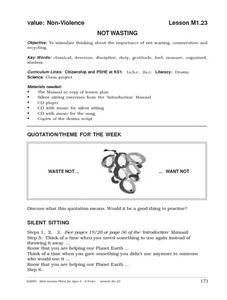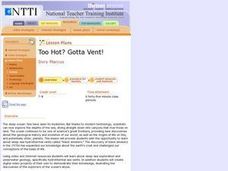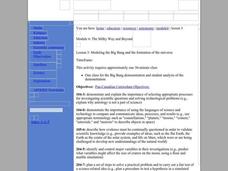Curated OER
What Lives in Water?
In this early childhood science worksheet set, students study the importance of water, and determine the difference between themselves and water dwellers. They look at adaptations, river life, rainforest life, food chains, pollution, and...
Curated OER
TAKING APART OWL PELLETS
Young scholars dissect and owl pellet and then reconstruct small rodents on a presentation board using a textbook picture as a guide.
Curated OER
What is Energy?
Youngsters take a look at the foods they eat, and how they provide energy for them to do things. They look at how body uses the food energy to create movement. Pupils also look at toys/devices in the room that need electrical energy...
Curated OER
Classification and Adaptations- Streams, Rivers, and Lakes - Where the Land Meets the Sea And Caribbean Reef
In this science worksheet set, students answer 14 short answer questions about the classification and adaptation of life in streams, rivers, and lakes. They also answer 15 questions about life "Where the Land Meets the Sea" and in a...
Curated OER
Greenhouse in a Bottle
Young atmospheric scientists create models of an atmosphere with and without clouds to determine the effect of cloud cover on Earth's temperatures, as well as figuring out whether dark or light surfaces absorb more energy. You may wish...
Carnegie Mellon University
Bathtub Model
Using a colorful infographic handout and a guide sheet, hold a class discussion about how a bathtub can serve as a model for the greenhouse effect created by Earth's atmosphere. Participants will understand that as energy or matter is...
Curated OER
Gravity Gets You Down
Students investigate the force of gravity and how it effects different objects that are put into acceleration when applied the experiment of free falling. They drop different objects that have a variety of masses and some that cause air...
Curated OER
Biosphere II
Students continue their examination of the existence of life on Earth. In groups, they determine the role of the water cycle and other biogeochemical cycles play in keeping balance on Earth. They participate in experiments to discover...
Curated OER
Rover Races
Students identify the challenges encountered by astronauts in operating a planetary rover. In this space science lesson plan, students create a rover using their team members. They follow a command sequence from the driver and navigate...
Curated OER
Birth of the Earth
Middle schoolers examine the major events that have taken place in the Earth's development. In this Earth activity students view a video and put major events in chronological order.
Curated OER
The Urban Explosion
Students investigate the uncontrolled development of the world's major cities. They define key vocabulary terms, view and discuss video excerpts, and complete a project that involves drawing a "perfect city," developing a plan to...
Curated OER
NOT WASTING
Young scholars brainstorm and analyze creative ways to not waste materials and recycle more as an individual. The theory and importance of conservation is also stressed within this activity. In addition, silent sitting is exercised,...
Curated OER
Time Line of Astronomy Events and Discoveries
Learners work in groups to present a segment of a timeline of events and discoveries in astronomy. In this astronomy lesson plan, students teach their classmates about their section of the timeline.
Curated OER
Too Hot? Gotta Vent!
Students study deep sea exploration and underwater geology, specifically hydrothermal sea vents. They create digital video projects of their own to demonstrate their knowledge, illustrating the discoveries of the explorers of the ocean's...
Curated OER
Eco Points Score Card
Students play a game in which points are assigned to daily activities which require fossil fuels or electricity. They compare the impact their energy and transportation choices have in everyday life.
Curated OER
Whale Watcher Game Lesson
Students participate in an online whale watching game. They identify the reasons for migration and describe the route. They make predictions on what would happen if the ways did not migrate.
Curated OER
Predator Protector Game
Students take on the role of an Ocean Adventures expedition volunteer member and are charged with protecting three species of sharks from danger in order to defend the balance of nature in the ecosystem. They play an online game which...
Curated OER
The Big Bang Theory
Students will use scientific reasoning to formulate ideas about the formation of the universe using the Big Bang Theory. The use of critical thinking skills is part of the activity and the foundation of the scientific method will serve...
Curated OER
Solar Matters II
Students research solar energy. In this solar energy lesson, students construct a KWL chart and research solar energy through various websites and related readings. Students complete a science journal page as an assessment.
Curated OER
Water Conservation
Students explore types of water reserves. In this water conservation instructional activity, students brainstorm ways water are used in their homes. Students use a graduated cylinder to simulate the amount of water on Earth and the...
Curated OER
Blast Off with Model Rockets
Students investigate science and math by building a rocket. In this geometry activity, students build a rocket using paper towel tubes while investigating questions about launching a rocket. They discuss balance and unique structure as...
Curated OER
The Solar Cycle
Students research the solar cycle. In this Science lesson, students use the internet to investigate the solar cycle. Students produce a spreadsheet and graph from the information collected.
Curated OER
Modeling the Big Bang and the Formation of the Universe
Sixth graders conduct an experiment to understand the Big Bang Theory. In this Big Bang Theory lesson, 6th graders will observe a balloon with confetti popping to emulate and analyze information related tot he Big Bang theory. Students...
Curated OER
Phase to Phase with the Moon
Fourth graders study the Moon phases. The instructional activity includes hands-on activities as well as web-based activities. They use models of the Moon and a lamp to study each of the phases of the Moon, and test their knowlege of the...

























